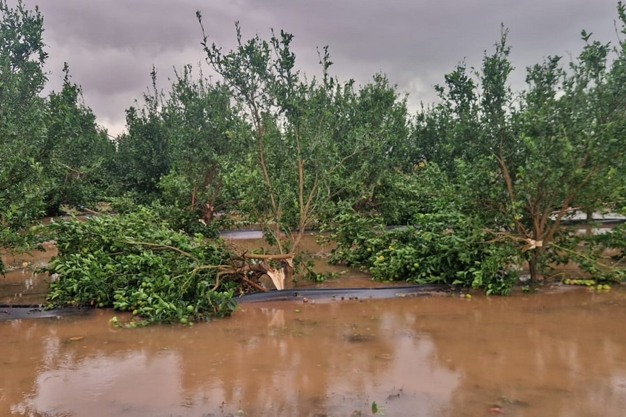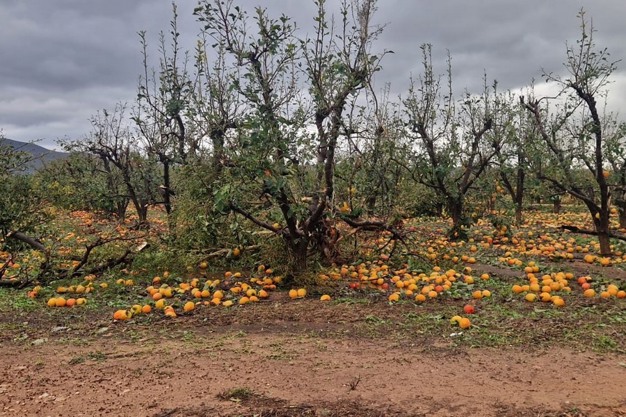The fruit and vegetable sector is working to get back to normal following the heavy rainfall, tornadoes, hail storms and floods, both in the areas directly affected by them and in many others where the effects have also been felt.
At the moment, the citrus and kaki supplies are very limited and, while the citrus supply will gradually increase in the coming weeks, the kaki one will continue to be limited for the rest of the season. Agroseguro has initially estimated the number of hectares affected in Valencia at 20,000, with citrus and kakis as the most affected crops, although vegetables and, to a lesser extent, woody crops, such as almond trees, have also been hit. The potential value of the crops is estimated at 159 million euros, although the actual extent of the damage still needs to be assessed.

"Today is the first day that we have had staff working in the plant, as we had been unable to work for a week due to the power cuts," says the manager of a citrus growing and marketing company from Algemesí, one of the towns affected by the floods in the province of Valencia.
"The whole thing happened when our chambers were full of stored fruit which couldn't be handled or packed in our facilities, and which had to be brought to other warehouses when we were finally able to access the industrial estate, which was flooded. Fortunately, since our plant was built with an elevation of 1.30 meters in anticipation of possible flooding, no water entered it. We have started working again, although still at limited capacity, as some of our staff have been badly affected by the floods and have lost a lot," he says.
"The orange and clementine fields from which we were getting our supplies have been badly affected," says a grower and exporter from La Ribera Alta, whose plant is located close to the worst affected areas. "We have continued with our daily activity, although at a very slow pace, doing our best to bring in fruit from other places, even from Almeria. It will take days to get things back to normal, because we are missing a lot of staff. Some of our workers disappeared in the floods and others come from very badly affected areas."
In the meantime, there are still kilometers of traffic jams around Valencia. On Tuesday, the National Traffic Directorate (DGT) reported more than 50 km of traffic jams. This is affecting the supply of the plants and fruit shipments. "Many of us are still working remotely, as traffic around Valencia is impossible because there are still roads cut off," says the manager of a citrus fruit trading company near the Valencian capital.
"The situation is chaotic," says a citrus exporter from the south of Castellon. "It is proving very difficult to stock up on oranges and clementines, both because of the transport situation and the incessant rain that has prevented the fruit from being harvested over the last 12 days. There are very severe supply shortages, while there's a high demand from all over Europe, including the domestic market."
"Today we have started harvesting at a very low rate in fields that are finally accessible, but it is worth recalling that the Clemenules, the main variety being harvested at the moment, needs six days to 'degreen', while many Oronules are already overripe due to excess water. Due to the lack of supply, prices have risen at source, but the main challenge is managing to get hold of goods," he says. "Moreover, there will be a multitude of quality problems and complaints at destination due to the impact of the humidity," he warns.
Eighty percent of the mandarins currently being sold in the markets come from Valencia and Castellon, while 15% come from Huelva and the remaining 5% from Seville, where the harvest of the earliest Navelina farms was delayed by the rains.

The impact of the storm on Valencian kakis is causing the demand in Huelva to soar
The kaki supply is also very limited. This crop has been severely hit by the storms and floods, as most of the production in Spain is grown in the province of Valencia. This has caused orders to soar in Huelva, where Rojo Brillante and Sharoni kakis are produced and where they are unable to keep up with the calls.
"A week after the floods, nobody can really say how much kaki there is going to be available from now on, although there are producers who have lost everything," says Rafael Perucho, Manager of the Regulatory Council of the PDO Kaki de la Ribera del Xúquer. "November is the month when we normally reach the peak of the season in terms of volumes, but this year it is clear that the supply will be limited until the end of the season."










